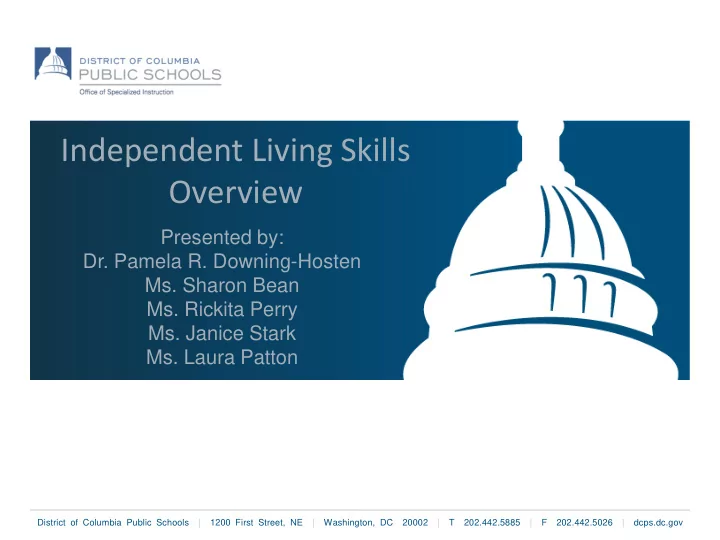

Independent Living Skills Overview Presented by: Dr. Pamela R. Downing-Hosten Ms. Sharon Bean Ms. Rickita Perry Ms. Janice Stark Ms. Laura Patton District of Columbia Public Schools | 1200 First Street, NE | Washington, DC 20002 | T 202.442.5885 | F 202.442.5026 | dcps.dc.gov
OSE PROGRAMS AND SERVICES - TRANSITION TEAM Introduction Purpose – The purpose of this presentation is to provide Professional Development (PD) on the Independent Living Skills Course Process – The PD will be conducted through this presentation, discussion on topics reviewed, and a panel. Payoff – At the conclusion of this PD participants will be able to discuss the three pillars of the Independent Living Skills Course, the outside resources associated with the course, and the intended outcomes of the course. 2 District of Columbia Public Schools District of Columbia Public Schools |
OSE PROGRAMS AND SERVICES - TRANSITION TEAM Norms • Be prepared • Utilize informed questioning • Look for opportunities to offer collaboration and support • Provide constructive, solution-based feedback • Practice self-regulation 3 District of Columbia Public Schools District of Columbia Public Schools |
Transition Team Purpose of the Course • The purpose of this course is to give students exposure to community-based experiences to supplement instruction about daily life activities. Students should be able to recognize different opportunities in their community and understand how to utilize resources. • Students in this course have the opportunity to apply self-advocacy and self-determination skills in their community while also gathering information about resources available to them outside of the classroom. • Students have explored varying concepts aligned to the common core that prepares them for their experience in the community. Students are then able to reflect on experiences following the close of an experience. 4 District of Columbia Public Schools |
Transition Team Course Themes • The course is taught across four different grade levels, from 9 th grade to 12 th grade. Each course has a different theme that student’s focus on and experiences are connected to as part of the curriculum. • The grade level themes teach students about various types of resources that are available to them and how they can interact with those resources. The themes are as follows: • 9 th Grade – Basic Community Resources • 10 th Grade – Daily Living Resources • 11 th Grade – Government Resources • 12 th Grade – Vocational Resources 5 District of Columbia Public Schools |
Transition Team Sample Community-Based Experiences 9 th Grade 10 th Grade • Police And Fire • Banks to Station Establish an Experiences Account 11 th Grade 12 th Grade • White House, • Rehabilitative Capitol, and Services Supreme Court Administration 6 District of Columbia Public Schools |
Transition Team Transition Planning • As a component of their course, all students will be required to complete a final project associated with their activities within the course. Students will be able to present their projects in their annual IEP meeting, using the following continuum for interaction: Student- Student- Student- Student- Participated Facilitated Engineered Conducted IEPs IEPs IEPs IEPs 7 District of Columbia Public Schools | September 13, 2013 District of Columbia Public Schools |
Transition Team Panel Members We are so pleased to have had a successful first year, which can be attributed to the dedication of our teachers and the strong partnership with the Arc of DC. Here to discuss the reflections of the first year are the following panelists: • Mary Lou Macriello, Executive Director of the Arc of DC • Laura Patton, Consultant, The Arc of DC • Sharon Bean, Special Education Teacher at Ballou SHS • Rickita Perry, Special Education Teacher at Eastern SHS • Janice Stark, Special Education Teacher at Cardozo EC 8 District of Columbia Public Schools |
The Postsecondary Transition Plan Web Resources DCPS.DC.GOV DCPSCEO.COM DCPSTRANSITION.COM Transition Team Contact TEL.(202) 442-4800 EMAIL: OSE.TRANSITION@DC.GOV 9 District of Columbia Public Schools | January 1, 2010 District of Columbia Public Schools |
Recommend
More recommend